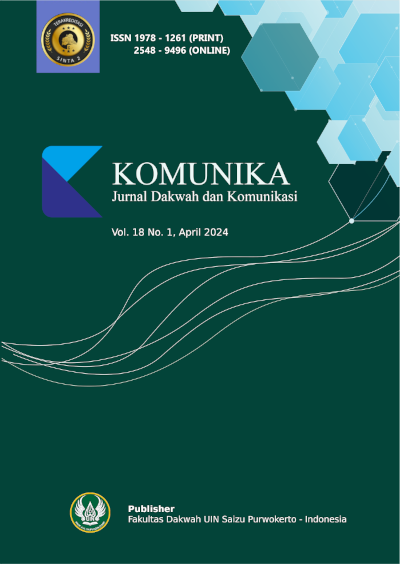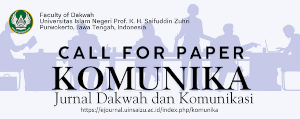Prophetic Communication in Historical and Axiological Review
DOI:
https://doi.org/10.24090/komunika.v18i1.7976Keywords:
Prophetic Communication, Historical, AxiologicalAbstract
Prophetic communication needs to be reviewed from a historical and axiological perspective. Understanding from a historical point of view means trying to see the Prophet Muhammad as the perpetrator of the history of prophetic communication, reviewing from an axiological point of view to see how far the benefits of this prophetic communication are to human life both personally and communally. Seeing the integration of ethical and aesthetic values that must exist in prophetic communication is the next important part of unraveling prophetic communication from an axiological perspective. The research method used in this research is qualitative with a literature study, analyzing literary references and providing a critical review of prophetic communication in the historical and axiological review of these references. Suppose research on prophetic communication tends to be in the form of implementation. In that case, this research reviews prophetic communication from a historical perspective, which is the initial foundation of prophetic communication, and axiologically to see its application in individual and social aspects more deeply. The ultimate goal resulting from the implementation of prophetic communication is, of course, as we have seen to this day, namely, a change in civilization, specifically the transition from the Jahiliyah era or before the presence of the Prophet SAW to modern life today. The results of this study indicate that prophetic communication is closely related historically and axiologically.Downloads
References
Abdulhak, I. (2008). Filsafat ilmu pendidikan. Remaja Rosdakarya.
Achmad, F. (2018). Studi Analitis Peristiwa Isra’Mi’raj Nabi Muhammad SAW dalam Pendekatan Sains. Momentum, 7(1), 159–184.
Adhasita, N., Sari, V. P., Putri, H., Ayunda, Y., & Bukhori, B. (2023). Revolusi Mental: Membangun Peradaban Masyarakat Bermoral Profetik Di Era Society 5.0. At-Taqwa: Jurnal Pendidikan Dan Islamic Studies, 1(2).
Adlini, M. N., Dinda, A. H., Yulinda, S., Chotimah, O., & Merliyana, S. J. (2022). Metode penelitian kualitatif studi pustaka. Edumaspul: Jurnal Pendidikan, 6(1), 974–980.
Al-Mishri, S. M. (2019). Ensiklopedi Akhlak Rasulullah Jilid 2 (Vol. 2). Pustaka Al-Kautsar.
Alisyahbana, T. (2018). Paradigma Ilmu Pengetahuan Dan Iman Dalam Peristiwa Isro’Mi’raj Nabi Muhammad Saw. El-Ghiroh: Jurnal Studi Keislaman, 14(1), 117–137.
Aswad, M. dkk. (2022). Konsep Komunikasi Profetik (kenabian) Sebagian Strategi Dakwah. Jurnal Shoutika, 2(1), 1–6.
Ayun, Q. (2018). Membumikan Dakwah Berbasis Komunikasi Profetik di Era Media Baru”. Jurnal Mumtaz, 2(2), 293–304.
Azizah, N., Tampubolon, A. P., & Sibarani, H. S. (2021). KOMUNIKASI ORGANISASI: Kepemimpinan dan Gaya Kepemimpinan: Komunikasi Organisasi, Kepemimpinan, Jenis Kepemimpinan, Gaya Kepemimpinan. KomunikA, 17(1).
Covey, S. R. (2004). The 7 Habits of Highly Effective People. Free Press.
Fatah, A. (2017). Keberkahan Al-Aqsha Perspektif Hermeneutika Schleiermacher. Jurnal Penelitian, 23–38.
Habermas, J. (1971). Knowledge and Human Interests (J. J. Shapiro (trans.)). Beacon Press.
Halik, A. (2018). Paradigma kritik penelitian komunikasi (pendekatan kritis-emansipatoris dan metode etnografi kritis). Jurnal Dakwah Tabligh, 19(2), 162–178.
Harahap, N. (2020). Penelitian Kualitatif (H. Sazali (ed.); 1st ed.). Wal ashri Publishing. Jl. Ekarasmi Medan Sumatera Utara.
Hasani, R. (2023). Memahami Isra’Mi’raj Melalui Konsep Time Travel Stephen Hawking. UIN Ar-Raniry.
Hidayatulloh, F. S. (2011). Salam dalam perspektif Islam. Jurnal Pendidikan Agama Islam-Ta’lim, 9(1), 89–94.
Horten, M., & Hager, V. J. (1974). Moral Philosophers in Islam. Islamic Studies, 13(1), 1–23.
Iqbal, M. (1981). Recontruction Of Religions Thought In Islam. Nasrat Ali Nasri Of Kitab Bavan.
Islamy, E., & Imam. (2020). Tesis “Strategi Komunikasi Profetik Pemerintah Kabupaten Labuhanbatu Melalui Kebijakan Publik Dalam Pemberdayaan Masyarakat Islam.”
Korac‐Kakabadse, N., Kouzmin, A., & Kakabadse, A. (2002). Spirituality and leadership praxis. Journal of Managerial Psychology, 17(3), 165–182.
Kruschwitz, N. (2012). How an abundance mentality and a CEOs fierce resolve kickstarted CSR at campbell soup. MIT Sloan Management Review, 54(1), 1.
Kuntowijoyo. (2018). Muslim tanpa Masjid. IRCiSoD.
Miswari, M., & Fahmi, D. (2019). Historitas dan rasionalitas Isra’Mi’raj. At-Tafkir, 12(2), 152–167.
Moenawar, M. G., Nasucha, M., & Arianti, G. (2017). Media komunikasi: Diskursus profetik, agama, dan pembangunan. UAI Press.
Muhlis, M., & Musliadi, M. (2022). Komunikasi Profetik di Media Sosial. RETORIKA: Jurnal Kajian Komunikasi Dan Penyiaran Islam, 4(2), 82–92.
Muslim, H. R. (1997). No Title (Vol. 162, Issue 259).
MZ, K. H. Z. (2011). No Title. https://www.youtube.com/watch?v=kVDCM83W32w
Pervez, M. A. (2019). LIBERTY, WEALTH AND MORALITY; BUILDING AN ISLAMIC CASE FOR OPEN MARKETS. Building an Islamic Case for Open Markets.
Rahman, T. (2021). Implementasi Kinesik, Proksemik, Paralinguistik dan Self Disclosure dalam Komunikasi Antarpribadi. Jurnal Semiotika, 15(2), 184–192.
Rahman, T. (2022). Etika Komunikasi Islam dalam Berbagai Perspektif (Intrapersonal, Interpersonal dan Kelompok Kecil. Jurnal Hikmah, 16(1), 35–54.
Rahman, T. (2023). Implementasi Akhlak Profetik dalam Komunikasi Interpersonal Nabi Ibrahim AS. Jurnal Hikmah, 17(1), 1–14.
Ridho, A. R. (2021). Peran Komunikasi Profetik Dalam Mewujudkan Masyarakat Madani Perspektif Al-Qur’an. El-Umdah, 4(2), 139–158.
Riyanto, F., & Waryani. (2012). Komunikasi Islam.Yogyakarta : Penerbit Galuh Patria.
Salam, B. (1997). Logika Material Filsafat Ilmu Pengetahuan. Rineka Cipta.
Shonhaji, S. Q. A. (2023). Metode Dakwah Perspektif Hadis: Telaah Hadis Salam. Maddah: Journal of Advanced Da'wah Management Research, 2(1), 1–18.
Smith, W. K., Besharov, M. L., Wessels, A. K., & Chertok, M. (2012). A paradoxical leadership model for social entrepreneurs: Challenges, leadership skills, and pedagogical tools for managing social and commercial demands. Academy of Management Learning & Education, 11(3), 463–478.
Sugiyono. (2012). Metode Penelitian Pendekatan Kualitatif, Kuantitatif, dan R@D. Alfabeta.
Sunardi, D. (2014). Etos Kerja Islami. JISI: Jurnal Integrasi Sistem Industri, 1(1).
Syahputra, I. (2007). Komunikasi Profetik. Simbiosa Rekatama Media.
Syahputra, I. (2017). Komunikasi Profetik Konsep dan Pendekatan. Simbiosa Rekatama Media.
Threet, A., Kroth, M., & Carr-Chellman, D. J. (2022). Conceptualizing An Abundance Mentality and Its Relationship to Lifelong Learning, Human Flourishing, and Profound Learning.
Wahab, M. A. (2020). Hijrah dan Kepemimpinan Profetik.
Waryani Fajar Riyanto. (2013). Seni, Ilmu dan Agama Memotret Tiga Dunia Kuntowijoyo (1943-2005) Dengan Kacamata Integral(isme). Jurnal Politik Profetik, 2(2).
Widayat, P. A. (2014). Kepemimpinan Profetik. Akademika: Jurnal Pemikiran Islam, 19(1), 18–34.
Downloads
Published
Issue
Section
License
Copyright (c) 2024 Taufik Rahman, Anisah Indriati, Muhammad K. Ridwan

This work is licensed under a Creative Commons Attribution-ShareAlike 4.0 International License.
Authors who publish with this journal agree to the following terms:
- Authors retain copyright and grant the journal right of first publication with the work simultaneously licensed under a Creative Commons Attribution-ShareAlike 4.0 International License that allows others to share the work with an acknowledgement of the work's authorship and initial publication in this journal.
- Authors are able to enter into separate, additional contractual arrangements for the non-exclusive distribution of the journal's published version of the work (e.g., post it to an institutional repository or publish it in a book), with an acknowledgement of its initial publication in this journal.
- Authors are permitted and encouraged to post their work online (e.g., in institutional repositories or on their website) prior to and during the submission process, as it can lead to productive exchanges, as well as earlier and greater citation of published work (See The Effect of Open Access).

























